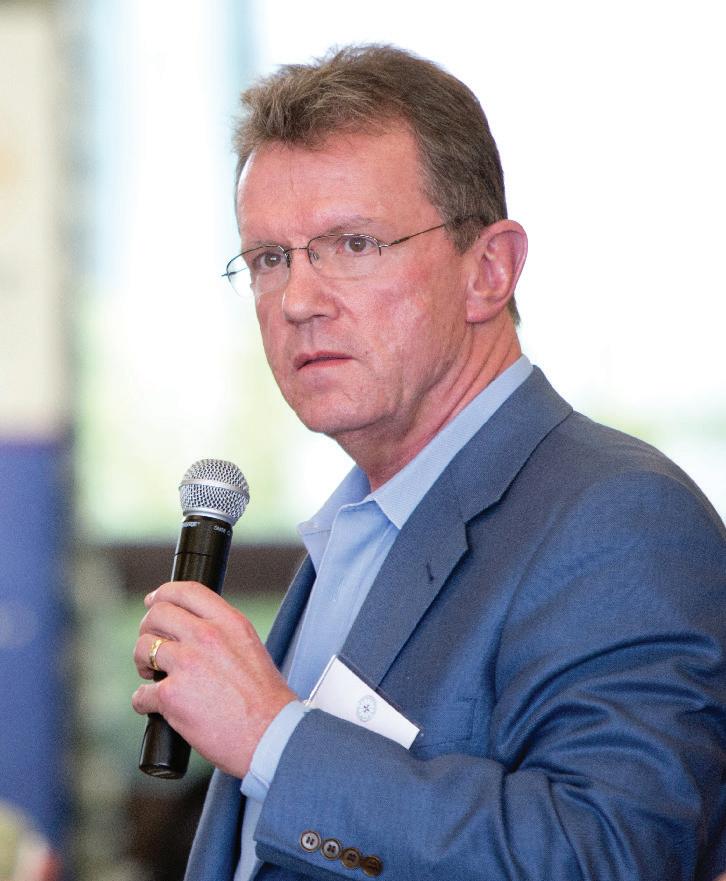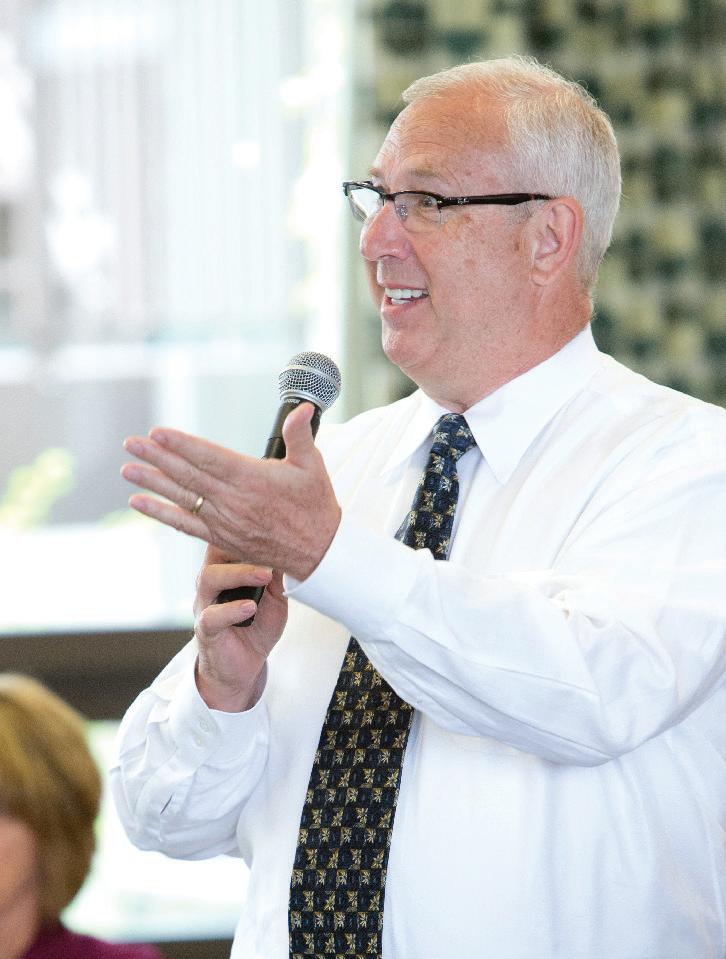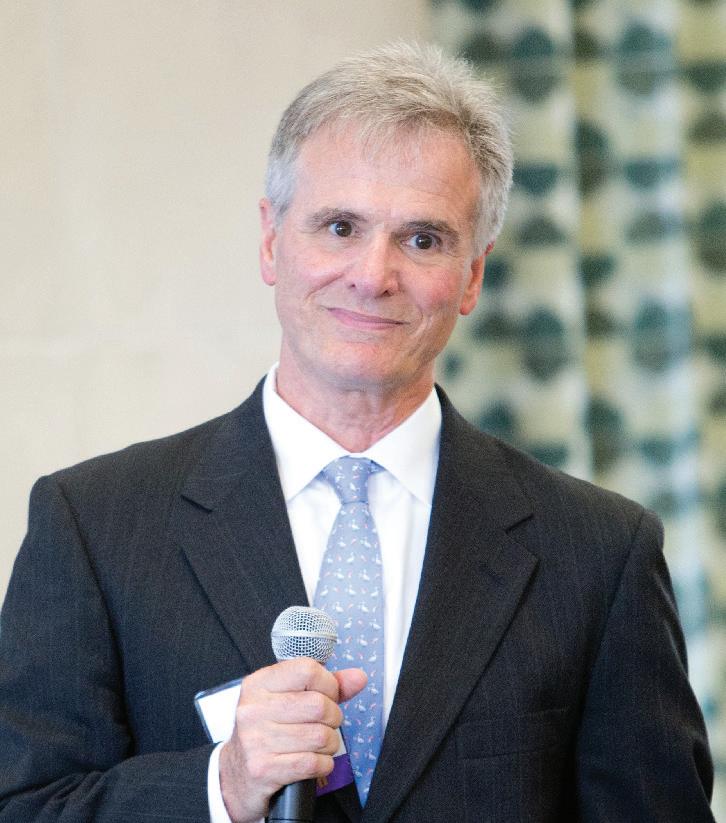
7 minute read
SELECTED QUESTIONS, ANSWERS, AND COMMENTS
ers saw the results -- helping to rebuild the Catholic school system down there -- they started seeing you as an effective organization and began to say, “Okay, maybe these Standards for Excellence are worth adopting.” I think the word has to get out, though. That’s where that the PR piece is so important, whether it’s directed at other priests or at the bishops themselves. I think it’s wonderful that Archbishop Kurtz is so committed to this effort.
FRED FOSNACHT President, MyCatholicVoice
WILLIAM O’CONNELL
Financial
Life Planner Ameriprise Financial
From your perspective as a priest and what you know about bishops who run dioceses, what do you think might be the reasons they would resist being open to adopting The Standards for Excellence, either at a diocesan or parish level?
REV. DONNELLY

If memory serves me, one of the real challenges the founders of the Leadership Roundtable faced when they started was the wariness of certain Church leaders that you were trying to tell us how to “do church.” If human change is difficult, imagine change within a 2000 year institution that has prided itself on “we’ve always done it this way.” I believe it was the work the Roundtable did for the Archdioceses of New Orleans [after Hurricane Katrina] that helped to turn the tide. Once Church lead-
I think many of us would be interested in understanding how you discerned, or distilled, your priorities. I think my own trepidation in entering into a process like this is that you get a bag full of every good idea that very well intentioned people have.
Paul Butler
We went back to the data and basically looked at everything, including finances, number of committees, number of parishioners, and what’s going on outside in the community. For example, What’s the biggest crisis we have in our community? At the time, there was a rash of young people dying from drugs and suicides. So we linked all our decisions back to the data to determine what were the most important things we should really be focusing on. And we let that guide our decisions.
REV. DONNELLY
The presupposition, too, was that we can’t do everything. We have limited resources, we have limited time, and we have limited energy. What do we want to really commit ourselves to if we’re going to stay faithful to the mission of the parish and the mission of the Church? And that’s tough. I was grateful we had somebody as skilled as Paul to talk the language and guide the process.
Kevin Kiley
Director of Strategy and Financial Planning, Archdiocese of Boston
Do you have a finance committee in addition to the financial stability group and, if so, how do they interact? And secondly, more in the form of a comment, I’ve never understood why we mandate Finance Councils but not Parish Councils. At the parish level, you have the Finance Council, or the Finance Committee, that sort of runs the show, and the Pastoral Council, that sort of sits off to the side, basically looking at adding mission types of things, to which the Finance Committee typically says, “No, we don’t have the budget for that,” or “We’re trying to save money.” I don’t think it’s a good way to run a parish.
REV. DONNELLY
A couple of members on our financial stability team are Finance Council members, as well, so there’s that automatic link. And while the Finance Council creates the budget and stays on top of spending, buildings and grounds, it’s our financial stability team that’s connected with the vision of where we’re going with all this. Their role is to keep the financial piece connected to the plan.
JIM FRIEND Chief Development Officer, Faith in the Future

Congratulations on all your success. Fantastic. And to see a pastor quoting Larry Bossidy is just a game changer, I have to say. My question is about finances. How did your effort in this area impact stewardship or your weekly offertory? Did you see a dramatic uptick after doing such a great job engaging the laity, their time and talents? I would assume that the treasury followed naturally.
REV. DONNELLY
It did, because one of the pieces that came out of a suggestion from the financial stability team was to get people to think in terms of monthly contributions, as opposed to paying for going to Mass, or not paying if they didn’t go the following week because of a snowstorm or because they were sick. We had our people think about that, and we decided to initiate online giving, as many parishes have done. A number of our parishioners took advantage, but others were very wary.
Paul Butler
On the issue of finances, our Haiti team is more or less self-funded. So if somebody sees a part of this plan they want to invest in, they can choose to do so. We have a commitment of $56,000 for building schools and health clinics down there, and that’s been made clear.
Male Speaker
Where have you seen the greatest impact in your parish from using the Standards for Excellence?
REV. DONNELLY
I’d say the whole area of accountability, for starters. Accountability to the larger group when it comes together. We saw an example of that at the end of May when we had our third meeting of the Pastoral Advisory Council, and people around the table – the chairs of each team -- told us what they had done. The idea was that they were accountable to the rest of the group, which really symbolized the larger parish. So definitely a sense of accountability.
The Standards have also had an impact on financial transparency. We’ve done a lot with that in our reporting to the parish, keeping them on top of it. And the idea, too, of tapping into the skill sets of our people, looking for them to take leadership in different ways.
Paul Butler
We passed out the Standards for Excellence booklet when we first started. Everyone read it and said, “What ideas or thoughts can we take from it to make sure that it informs our work as well as the operational management structures and disciplines we need in place to run a parish? And it’s also served as a checklist when we go back and ask ourselves, “Are we still adhering to this and that.” It’s almost shifted the discussion from ‘who’s accountable’ to ‘what we’re committed to.’ And that’s a fine line because you’re accountable for delivering on what you have to do as a team leader, but you’re committed to the other seven members of the Pastoral Advisory Council -- you commit to not let them down, and to help each other out. It’s magical the way it’s transformed the way we work together.
Male Speaker
Before you did the plan, how did you operate? Did you have to unlearn anything as pastor to work with your parish communities this way? And what have you learned about why this is an important way to work?
REV. DONNELLY
I like to think I’ve always operated collaboratively. I worked in seminaries for a long time, and lived in small communities with guys, and there was this idea of personal accountability, one to another, and I like to think I carried that over to the parish. The big difference for me comes from two directions: one is being a part of the Roundtable over the years, and the second is working with a skilled professional like Paul with insights on what we need to do make this happen.
JIM DUBIK
Chair, The Leadership Roundtable
I’d like to ask Paul the same question, but from the parishioners’ viewpoint: what have they seen that’s different?
Paul Butler
One of the biggest things is that we now have a collaborative model to ‘do church’ differently. The role of the laity in our parish was a big ‘aha!’ moment for many people, even those on the planning committee – the realization, “It’s our Church.”
Another big thing has been these conversations: Let’s get people talking about their faith. Let’s not avoid some of the dicey issues about our Catholic faith. Let’s talk about those and come to understand some of these things a little bit better. Let’s talk to our neighbors. Geographically, we have a lot of people who have come to Southbury to retire, people who are by and large Northeasterners. And we Northeasterners, especially we Irish Catholics, don’t talk about our faith a lot. So it’s really bringing that out in the open and making it more normal.
A good example of conversations is that at the height of the economic recession, we had a lot of people out of work in our parish, and they’d run to Father for counseling – “What do I do?” So we set up, as part of the Pastoral Care Committee, a career transition ministry. I got it up and running along with another individual who had worked in HR. We have 10 to 15 people who’ve attended every month for the last two years, and now they don’t have to go to Father, unless it’s for another matter. We help them network, and have an 80 percent success rate placing people in jobs. It’s worth noting we also do this for people who are not members of our parish. We want to be known for what we do for our community.
THOMAS HEALEY Partner, Healey Development
Father Joe, what happens to this model when another priest comes in as pastor? Isn’t there a risk of it either falling apart, the next priest not liking it, or just confusing people?
Joe Donnelly
There’s certainly a risk, but that’s an issue that faces all parishes and dioceses. My hope is that more and more, people can take on this model, this image, this role they have as the people of God, and try to really embody it so if somebody came in and tried to radically change things, they would take the position, ‘This is the way we’ve been doing it, and it’s the way we truly believe in.” One of the saddest parts of priesthood is knowing you could pour out your life’s blood for a parish or a ministry somewhere, and the minute you’re gone, it could all change because, by and large, the priest has all the power in the Church. I think that’s changing, at least I hope it’s changing.







